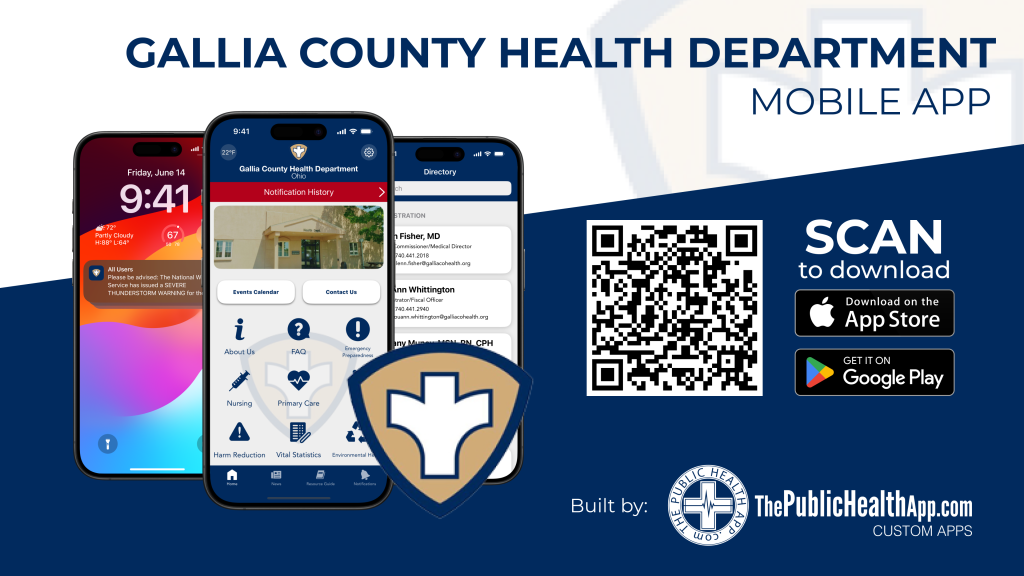Food Safety
| File Name | Description |
|---|---|
| Temporary Food License Application |
Fill out both pages of application completely and take to the Gallia County Health Department at least two weeks prior to the event. |
| Boil Advisory |
What to do when there is no water and more importantly, when it's turned back on. |
| Keep Food Safe During a Power Outage |
What to do when the lights go out. |
| Cold Storage | These short, but safe, time limits will help keep refrigerated food from spoiling or becoming dangerous to eat. Because freezing keeps food safe indefinitely, recommended storage times are for quality only. |
| Cooking Temperatures |
How can you tell when it's done? |
| Choosing a Sanitizer |
What to use after you clean it. |
| Foods and Allergies |
This information could save a life. |
The Gallia County Board of Health is charged with the enforcement authority of Ohio Revised Code, Chapter 3717 and Ohio Administrative Code, Chapter 3717(Ohio Uniform Food Safety Rules) ,Ohio Administrative Code 3701-21 (Food Service Administrative Rules) and Ohio Administrative Code 901:3-4 (Retail Food Establishment Administrative Rules) concerning the construction, operation and sanitation for Food Service Operations (FSO), Retail Food Establishments (RFE), Vending Locations, Mobile Food Services Operations, Mobile Retail Food Establishments, and Temporary FSO's or RFE's.
Definitions
Food Service Operation Class I - sells only pre-packaged food, self service drinks or over-the counter drugs. These operations pose the smallest risk of foodborne disease.
Food Service Operation Class II - handles or prepares non-potentially hazardous foods or that holds potentially hazardous foods at the same temperature at which they are received or heats individually packaged, commercially processed potentially hazardous foods. These operations pose an minimal risk of foodborne disease.
Food Service Operation Class III - handles or cuts raw meat or cooks potentially hazardous foods for immediate consumption or re-heats individual portions of food. These operations pose a higher risk of foodborne disease.
Food Service Operation Class IV - cools and re-heats bulk quantities of food, offers raw ready to eat potentially hazardous food, or serves high risk clientele or caters. These operations pose a higher risk of foodborne disease.
Mobile Food Service Operation - is operated from a movable vehicle, portable structure, or watercraft and that routinely changes location, except when the operation remains at any one for more than forty consecutive days.
Temporary Food Service - is operated at an event for not more than five consecutive days, and for not more than 10 events (6 days maximum if held at Gallia County Fair and a resident of Gallia County)
| File Name | Description |
|---|---|
| Handwash Sink Poster | Handwash sink poster for food establishments. (Print as many as you need.) |
| Plan Review Guide | License application and provides detailed assistance for the plan approval phase of your food service operation. |
| Starting a Food Business in Gallia County | It's not all about cooking great meals. |
| Temporary Food License Packet | Temporary food license application and the information you need to know when serving food to the masses. |
| Home Bakery License Information | Let them eat cakes, pies, or doughnuts. |
| Mobile Food Guidelines | Cooking on the run. |
| Pushcart Operations | Cooking on the sidewalk. |
| Mobile Requirements Checklist | Provides a requirements checklist for your mobile food operation. |
The Board of Health is charged with the enforcement authority of Ohio Revised Code, Chapter 3717 and Ohio Adiministrative Code, Chapter 3717(Ohio Uniform Food Safety Rules) , Ohio Administrative Code 3701-21 (Food Service Administrative Rules) and Ohio Administrative Code 901:3-4 (Retail Food Establishment Administrative Rules) concerning the construction, operation and sanitation for Food Service Operations (FSO), Retail Food Establishments (RFE) and vending locations.
Definitions
- Retail Food Establishment Class I - sells only pre-packaged food and drinks, self service fountain drinks or baby food and formula. These establishments pose the smallest risk of foodborne disease.
- Retail Food Establishment Class II - handles or prepares non-potentially hazardous foods or that holds potentially hazardous food at the same temperature at which it is received or heats individually packaged, commercially processed potentially hazardous foods. These establishments pose an minimal risk of foodborne disease.
- Retail Food Establishment Class III - handles or cuts raw meat, prepares potentially hazardous food for immediate consumption, cuts or slices ready-to-eat meats or cheeses, or re-heats individual portions of food. These establishments pose a higher risk of foodborne disease.
- Retail Food Establishment Class IV - cools and re-heats bulk quantities of food, offers raw ready to eat potentially hazardous food, serves high risk clientele or caters. These establishments pose a higher risk of foodborne disease.
- Cottage Food Operation is a person who in person's home, produces food items that are not potentially hazardous (bakery products, jams, jellies, fruit butter, candy).
| File Name | Description |
|---|---|
| Date Marking Flow Chart | A flow chart to keep food fresh and safe. |
| Our Enforcement Policy | These are our expectations. |
| Food Employee Illness Agreement | I'm sick, may I still work my shift? The answer, it depends. |
| The Person in Charge | This is the "Go-To" person. |
| Mobile Food Code References | Useful food code information for mobile food vendors. |
| Emergency Handbook for Food Managers | Hey Boss! What do I do now?? |
| Emergency Handbook for Food Employees | Don't worry boss. I know how to handle it. |
| Emergency Training Guide | Food employee emergency training guide for food managers. |

